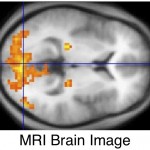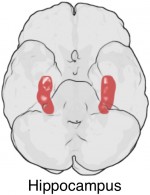 Well, not see the future, but imagine it. Brain physiologists in the past have proposed that the hippocampus is part of the network of brain regions responsible for the ability to remember the past and imagine the future. This supposition has been based on a handful of case studies in which people with brain damage (damage that included their
Well, not see the future, but imagine it. Brain physiologists in the past have proposed that the hippocampus is part of the network of brain regions responsible for the ability to remember the past and imagine the future. This supposition has been based on a handful of case studies in which people with brain damage (damage that included their hippocampuses hippocampi) have had both memory impairment and trouble trying to imagine plausible future events. However, some recent research published in PNASProceedings of the National Academy of Sciences suggests that the hippocampus doesn’t actually play a crucial role in imagining the future.
 Studying the human brain is a tricky endeavor. Not only is the brain extraordinarily complex, but there are obvious restrictions on running “experiments” on humans. Therefore, our knowledge of the brain’s functioning is heavily dependent on non-invasive imaging techniques (e.g., MRImagnetic resonance imaging) and rare case studies of people with well-characterized and localized brain damage (e.g., hippocampus damage).
Studying the human brain is a tricky endeavor. Not only is the brain extraordinarily complex, but there are obvious restrictions on running “experiments” on humans. Therefore, our knowledge of the brain’s functioning is heavily dependent on non-invasive imaging techniques (e.g., MRImagnetic resonance imaging) and rare case studies of people with well-characterized and localized brain damage (e.g., hippocampus damage).
 The authors of this paper studied five patients with bilateralon both sides of the brain hippocampal damage. Unlike patients that had been studied in the past, who had problems with multiple portions of their brains, these patients had damage that happened to be specific to their hippocampi (brain imaging can show what parts of the brain are have suffered injury). Two of the patients had overdosed on drugs and had stopped breathing long enough for brain damage to occurdon’t do drugs, kids. One patient had had a heart attack, one had toxic shock syndrome, and one had viral encephalitis.
The authors of this paper studied five patients with bilateralon both sides of the brain hippocampal damage. Unlike patients that had been studied in the past, who had problems with multiple portions of their brains, these patients had damage that happened to be specific to their hippocampi (brain imaging can show what parts of the brain are have suffered injury). Two of the patients had overdosed on drugs and had stopped breathing long enough for brain damage to occurdon’t do drugs, kids. One patient had had a heart attack, one had toxic shock syndrome, and one had viral encephalitis.
A sixth patient had slightly more extensive brain damage – it involved large legions on her medialtoward the inner portion of the brain temporal lobe (which includes the hippocampus, but also includes a bit more). The lesions were from unknown causes – she somehow got amnesia (because of the lesions) in 1988 and presumably couldn’t remember if there was some specific head trauma or illness that had brought on the damage.
 All of the patients were prompted with random words (such as “tree”) and asked to describe a memory relating to that word or to imagine a plausible event that could happen to them in the future involving that word. The researchers gave the same prompts to a control group consisting of people approximately the same age as the patients. They then analyzed the narratives of the patients and the controls, looking for the quantity and quality of details provided in the narratives. The patients didn’t show any impairment in their ability to recall events from their distant past, or to imagine events in the future; though they had some trouble remembering things from the recent past.
All of the patients were prompted with random words (such as “tree”) and asked to describe a memory relating to that word or to imagine a plausible event that could happen to them in the future involving that word. The researchers gave the same prompts to a control group consisting of people approximately the same age as the patients. They then analyzed the narratives of the patients and the controls, looking for the quantity and quality of details provided in the narratives. The patients didn’t show any impairment in their ability to recall events from their distant past, or to imagine events in the future; though they had some trouble remembering things from the recent past.
The researchers concluded that the hippocampus must not be responsible for the ability to imagine the future. Mapping out the functions of the brain is a process of elimination. The hippocampus can be ruled out in this case, leaving several other options as the future-imagining portion(s) of the brain. The authors suggest that the medial frontal cortex and the lateral temporal cortex, which are already known to be important for memory, may be the portions that imagine future events.
 A last thought: imagining future events is important for more reasons than daydreaming. It would be difficult to make responsible choices without being able to imagine potential consequences. Or to wax philosophical, isn’t imagining the future kind of what “hope” is?
A last thought: imagining future events is important for more reasons than daydreaming. It would be difficult to make responsible choices without being able to imagine potential consequences. Or to wax philosophical, isn’t imagining the future kind of what “hope” is?
And a last last piece of trivia: the hippocampus is shaped kind of like a seahorse. Its name is derived from the Greek name for a mythical creature that is part horse, part dolphin.

